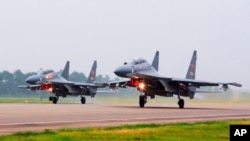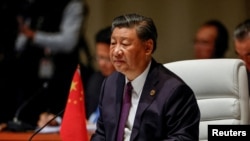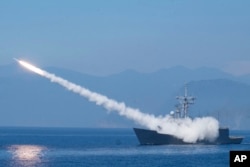A top Chinese military official has vowed to "show no mercy" toward any move toward Taiwan independence despite turmoil in the top ranks of the country's armed forces.
"No matter who wants to separate Taiwan from China in any form, the Chinese military will never agree and will show no mercy," said People's Liberation Army General Zhang Youxia. Zhang is vice chairman of the Central Military Commission of the Chinese Communist Party.
His remarks came at the 10th Xiangshan Forum on Monday in Beijing. More than 1,800 people attended the two-day forum — China's biggest annual event focused on military diplomacy.
These included 99 official delegations and defense ministers from 19 countries, as well as military chiefs, international organization representatives, experts, scholars and observers, according to China's official Xinhua news agency. The United States sent a representative in what was seen as a slight thaw in the freeze in U.S.-Chinese military-to-military communications.
Notably absent, however, was former Chinese Defense Minister Li Shangfu, whose dismissal was announced a week earlier. China did not explain why or appoint a replacement, but outside observers believe the move had more to do with President Xi Jinping's anti-corruption drive than with military considerations.
In August, two Chinese senior Rocket Force commanders were dismissed and replaced by people from the Air Force and Navy with no experience in nuclear weapons management, a principal responsibility of the Rocket Force.
Roderick Lee, research director at the U.S. Air University's China Aerospace Studies Institute, said the high-level changes in the Chinese military wouldn't affect most operational units.
"If there are lower-echelon guys being taken out as well, that probably has a greater impact," Lee said Tuesday at an event hosted by the Center for Strategic and International Studies in Washington. "But day-to-day [People's Liberation Army] operational readiness on the conventional or nuclear side, I doubt it is affected."
He said the PLA's administrative and operational functions are designed to be robust to absorb losses from losing even the entire party committee of a unit by having backup plans or processes to fill vacancies and compensate for losses.
Since taking power in 2012, Xi has cracked down on corruption in the military, although some believe he may also be bringing down political opponents.
Lee said since corruption is the norm in China's military, removing people from higher positions will not make the PLA less stable.
"You [Xi] went through a system; you cleaned house, where corruption was the norm," he said. "The people that you have left aren't not corrupt. They're just the least bad option you had left at those senior echelons. It's hard to expect them not to be tempted again to either get back into corruption or remain corrupt and just try to hide it a little better. So, in that sense, it's hard to go down from stability."
However, Lee said, such a corrupt system may leave Xi with no confidence in the PLA's ability to accomplish the tasks he requires.
"I think Xi Jinping is probably quite frustrated that approaching a decade of anti-corruption efforts has apparently yielded not a whole lot to show for it, because people are still apparently willing to engage in corrupt activities. Not this year, but one or two years ago, there was a whole slew of senior officials in the defense industry that were arrested for corruption issues," he said.
Pei Minxin, professor of government at Claremont McKenna College in California, said in a Tuesday column in Bloomberg, "Arresting more generals won't solve his [Xi's] problem. He must make the PLA less politicized and more transparent. Otherwise, China risks losing not just the battle against corruption but its next war."
Lukas Filler, a retired U.S. Navy commander who is now a professor at the Daniel K. Inouye Asia-Pacific Center for Security Studies, told VOA Mandarin during an Asia-Pacific Center webinar on Tuesday, "There is a fairly widespread sense amongst Western analysts and scholars that PLA leaders, the CMC [Central Military Commission] and Xi Jinping are quite concerned about the professionalism of the PLA."
As Zhang spoke at the forum, China stepped up its military pressure on Taiwan. Taiwan's Ministry of National Defense announced on Wednesday that the Chinese military had sent 43 sorties by various types of military aircraft and seven ships to disrupt Taiwan over the previous 24 hours.
Mark Parker Young, a senior fellow at the Atlantic Council's Global China Hub, published an article on October 20 saying the clean sweep of the Rocket Force's leadership team and the imposition of outsiders to replace them indicated that Xi probably did not anticipate fighting a large-scale conflict soon.
"If he [Xi] foresaw an imminent likelihood of war, then he probably would not have uprooted the Rocket Force's entire leadership, or he at least would have chosen replacements more familiar with the force," Young said.
But some observers worry that China and the United States will face a critical moment before the inauguration of Taiwan's new president next May. They say China will continue to test the resolve of the United States and Taiwan.
Brent Sadler, a senior fellow of naval warfare and advanced technology at the Heritage Foundation, and Hunter Kovach, a member of the Young Leaders Program at the Heritage Foundation, wrote Monday in The Daily Signal that China's recent military activities around Taiwan had reached new heights, and that the United States needed to be ready militarily in the region.
"This sustained presence is inherently destabilizing as it enables the Chinese Communist Party's military, called the People's Liberation Army, or PLA, to ratchet up tensions quickly or worse, without much warning," they wrote.
"In the meantime, China's increased military operations also exhaust and condition Taiwan's military responses for when Xi's communist regime decides to turn an exercise into a prelude for attack. Increasingly, China is confident about using its military to send strategic messages to the United States."
Shen Ming-shih, director at the Institute for National Defense and Security Research in Taiwan, said at the Center for Strategic and International Studies event that while there might be multiple opportunities for China to invade Taiwan, the PLA may not be capable of a war if the U.S. is involved.
"I think that China right now is not ready because the gap between the United States and PLA is huge," he said. "Maybe [in] 10 to 15 years."
Adrianna Zhang contributed to this report.








